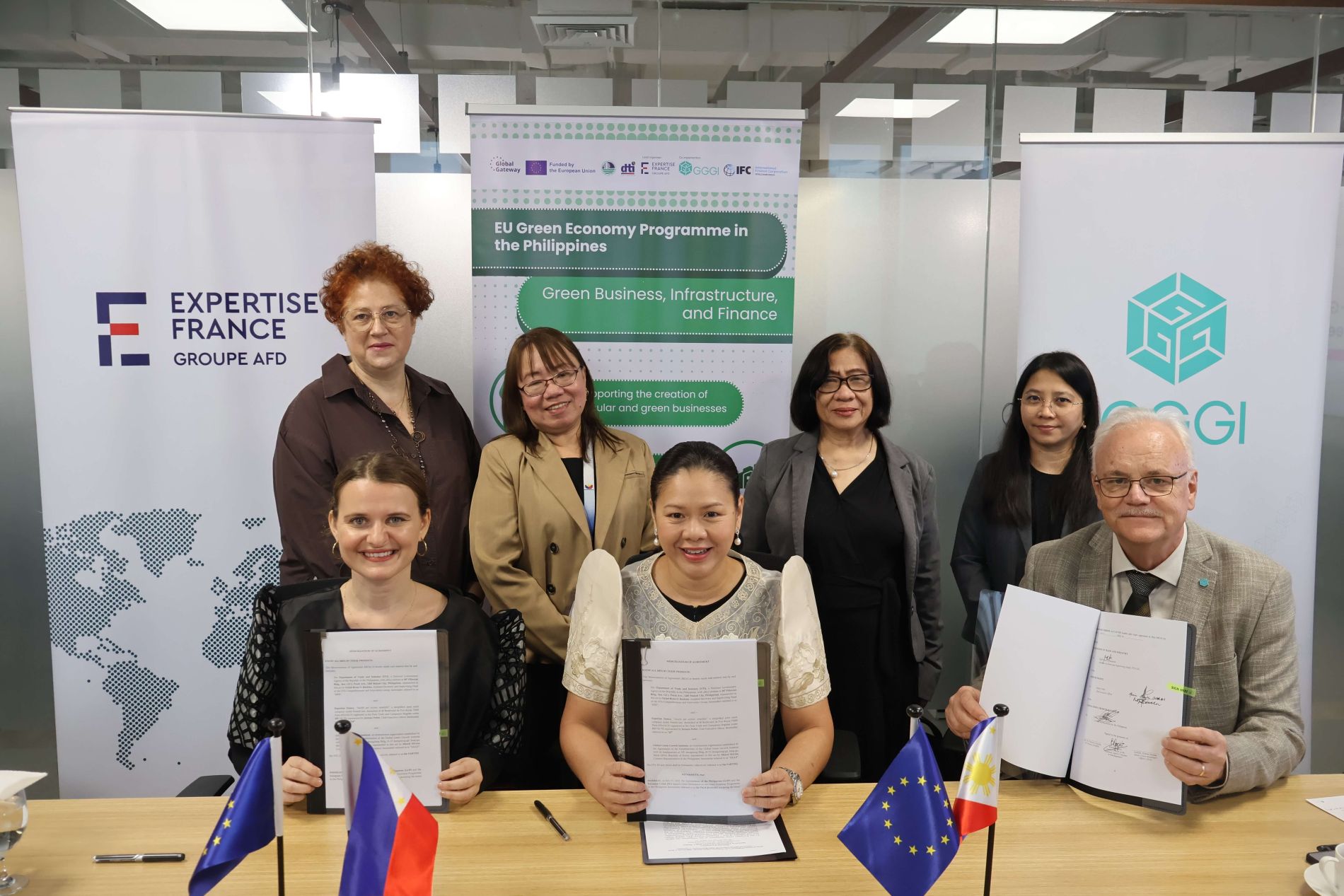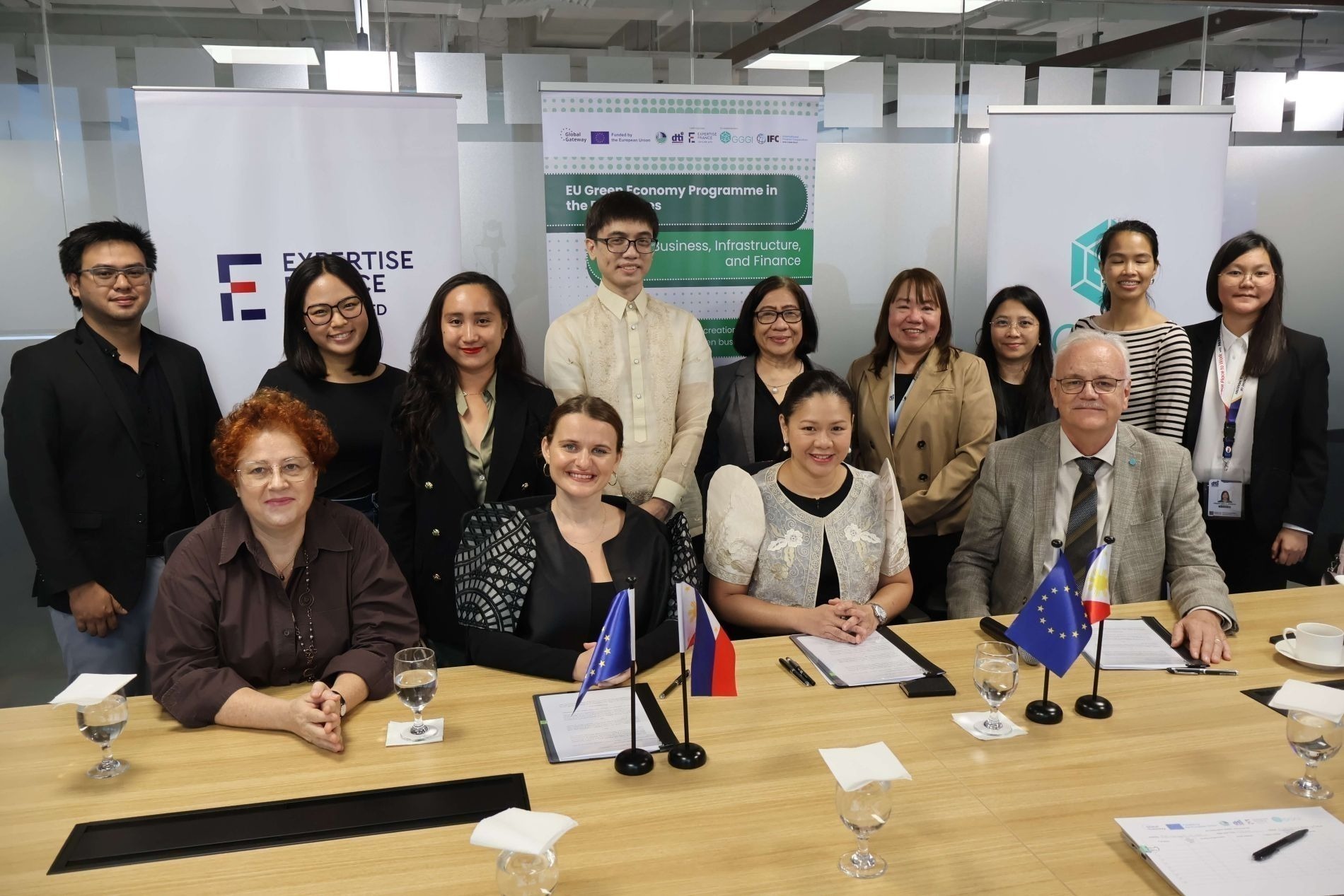MAKATI CITY – The Department of Trade and Industry (DTI), Expertise France (EF), and Global Green Growth Institute (GGGI) held the ceremonial signing of the Memorandum of Agreement (MoA) formalizing the collaborative partnership between the three institutions in realizing the European Union-Green Economy Programme in the Philippines (EU-GEPP) StrategicObjective 3 (SO3): Increased involvement of the private and financial sectors into circular, waste-reduction economy.
The EU-GEPP is a five-year, €60 million (PhP3.67 billion) European Union-funded program that will run up to 2028. The Programme links European and Filipino partners to foster a circular economy with the ultimate goal of reducing waste and carbon emissions. In doing so, the EU-GEPP will generate sustainable and inclusive growth through investments and green job creation while also improving energy efficiency, promoting clean energy use, and accelerating climate change mitigation and adaptation.
The EU-GEPP has four main thrusts or strategic objectives, of which SO3 focuses on supporting the private sector to create green business innovations and transform towards circular business models. EU-GEPP SO3 is co-led by the DTI, together with the technical partners EF, GGGI, and the International Finance Corporation (IFC), and is joined by the Department of Environment and Natural Resources (DENR), Department of the Interior and Local Government (DILG), Department of Finance (DOF), Department of Labor and Employment (DOLE), Department of Science and Technology (DOST), Public-Private Partnership (PPP) Center, Technical Education and Skills Development Authority (TESDA) in the inter-agency technical working group.

DTI, EF, and GGGI representatives sign the MoA formalizing the partnership for EU-GEPP SO3 on 27 March 2025 at the CIG Conference Room, Filinvest Bldg. Front row from left to right: EF Project Leader Marie-Maylis Charlat, DTI-CIG Asec. Nylah Bautista, and GGGI Country Representative Marcel Silvius. Back row from left to right: Agence Française de Développement Country Director Bénédicte Gazon, DTI-BPRI OIC Director Ma. Theresa Faustino, DTI-RGMS Director Lydia Guevarra, and GGGI Senior Assistant Reby Orbista.
DTI Assistant Secretary Nylah Rizza D. Bautista, supervising head of the DTI-Competitiveness and Innovation Group, affirmed the commitment of the DTI in realizing the goals of the EU-GEPP and highlighted the impact of fostering a green and sustainable circular economy in the Philippines, stating that: “By reducing waste and embracing sustainable solutions, we are not only addressing environmental challenges but also unlocking economic opportunities for our industries and communities. Together, we can build an ecosystem where green investments thrive and responsible business practices are the norm.”
Agence Française de Développement (AFD) Country Director Bénédicte Gazon underscored the support of AFD in realizing the activities of GEPP SO3, “In France, we have quite the experience in terms of circular economy, and this French touch represents an extensive experience to share and be channeled to you.”
GGGI Country Representative Marcel Silvius highlighted the significance of the MOA and what it represents: “It’s very nice to sign a MOA after the work has already started as it shows that is not just an intent, but it’s really a formalization - that we are really happy with the collaboration and we want to continue and move towards achievement in the field of green finance, green investment in the Philippines.”
The EU-GEPP SO3 will launch its Green Up to Scale Up grant for entrepreneurial support organizations or startup enablers who can support eco-startups with innovative green business models this year. Information sessions on the Call for Projects guidelines will be held online and in-person through roadshows in NCR, Baguio, Iloilo, and Davao in the second quarter of 2025. Another grant supporting the transformation of micro, small, and medium enterprises (MSMEs) into circular business models is also slated to be launched later this year.
Background information
Funded by a EUR 60 million (PhP 3.67 billion) grant from the European Union, the EU-Philippine Green Economy Partnership is a programme under the EU Global Gateway initiative that runs from 2023-2028 in collaboration with the national government, local government units (LGUs), and the private sector. The Programme links European and Filipino partners to foster a circular economy and the reduction of plastic waste. It also aims to improve energy efficiency, promote renewable energy use and climate change mitigation and adaptation. Using a whole-of-nation approach, the programme is focused on sustainable and inclusive growth through technology transfers, investments and job creation.
The programme is implemented by the Department of Environment and Natural Resources as the overall lead agency, in partnership with the Department of the Interior and Local Government, the Department of Trade and Industry, and the Department of Energy. The government agencies are supported by the technical partners, the United Nations Development Programme (UNDP), Germany's development agency GIZ, Expertise France with Global Green Growth Institute (GGGI), and the International Finance Corporation (IFC) – a member of the World Bank Group. The programme is aligned with global efforts to reduce greenhouse gas emissions and enhance climate change policies, including the negotiations on the Global Plastic Treaty. The EU-PH Green Economy Partnership will mobilise over 466 million euros (₱29 billion) co-funded by the EU and some of its Member States in support of green transition programmes and instruments in the Philippines, from development finance to inclusive circular economy projects.
